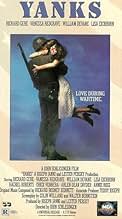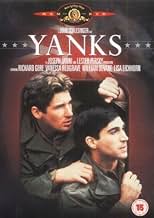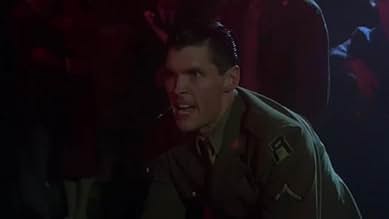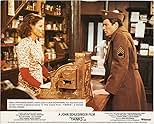AVALIAÇÃO DA IMDb
6,4/10
3,9 mil
SUA AVALIAÇÃO
Adicionar um enredo no seu idiomaJoining WWII, USA ships soldiers to UK. Matt and John arrive in 1942. Each see a local woman - married or to be engaged with soldiers serving faraway.Joining WWII, USA ships soldiers to UK. Matt and John arrive in 1942. Each see a local woman - married or to be engaged with soldiers serving faraway.Joining WWII, USA ships soldiers to UK. Matt and John arrive in 1942. Each see a local woman - married or to be engaged with soldiers serving faraway.
- Direção
- Roteiristas
- Artistas
- Ganhou 2 prêmios BAFTA
- 6 vitórias e 7 indicações no total
Philip Wileman
- Billy Rathbone
- (as Philip Whileman)
Andy Lucas
- The Americans - Cook
- (as Andy Pantelidou)
Avaliações em destaque
The film works for me because it concentrates on the three relationships and lets the war get on with itself. It was written from a British viewpoint and reflects the experiences of many people in war-torn Britain who came in to contact with American servicemen. The impact of the arrival of so many hearty, healthy and relatively wealthy young men was massive. The film struck a chord with many people in the UK, both of my parent's generation - who lived through the war, and my generation - who had heard all about it. The fact that the film was set in the north of England accentuated the gulf which existed in our common language. Many a GI must have been baffled by our slang. The three relationships in the film worked quite well because each one was different. How many times must these events have happened for real? The film isn't as good as THE WAY TO THE STARS of 1945, but it did recreate the war-time atmosphere quite well and evokes a period of history which is still vivid in the minds of many who lived near US bases in the UK in WW2.
Those of us who have seen some of the more recent wartime romance movies (e.g., Pearl Harbor) will be eternally grateful for this well-done picture with its ensemble cast. I liked it so much that I bought a copy on DVD.
This was the first time that I had seen William Devane and Lisa Eichorn in a movie, and I believe their performances were excellent. When William Devane, as the Captain, busts the NCOs for their conduct, it was the height of wartime realism at a human level.
I loved the little nuances ... the mother wrapping the string around her hand after she receives the gift of a cake from Richard Gere ... the little boy and the bicycle ... the steam rising up around the train at the end ... excellent touches ...
This was the first time that I had seen William Devane and Lisa Eichorn in a movie, and I believe their performances were excellent. When William Devane, as the Captain, busts the NCOs for their conduct, it was the height of wartime realism at a human level.
I loved the little nuances ... the mother wrapping the string around her hand after she receives the gift of a cake from Richard Gere ... the little boy and the bicycle ... the steam rising up around the train at the end ... excellent touches ...
This is a beautifully judged and paced 1979 film by John Schlesinger, which explores wartime romance and a unique culture clash, with sensitivity, wit and an affectionate eye for the period in which it is set. The time, 1943/4; the place, a small town in the north of England; the parties, the US Army gathering for the invasion of mainland Europe, and the locals grateful for the military assistance but watchful for the virtue of their wives and daughters.
Richard Gere's Sergeant-Cook, Matt, is surely still one of his best and certainly most sympathetic roles. His love affair with shopkeeper's daughter Jean (Lisa Eichhorn) - together with another on/off romance further up the social scale between William Devane's Captain and Vanessa Redgrave's upper class lady - highlight the painful choice between love and loyalty which war often presents. Meanwhile, the sunnier, trouble-free pairing and marriage of boxer Danny (Chick Vennera) and happy-go-lucky Mollie (Wendy Morgan) demonstrates that war can offer fresh starts as well as tragic ends.
Though Schlesinger bases most of the film on the moral (and cinematic) values of the time in which it is set, he reminds us in one sequence of the segregation and race problems in the US Army, which would not be resolved until after the war (and of wider race problems in the US generally, which are still not resolved). Rightly, the movie makes no attempt to avoid emotion; and the ending with the troops, including Matt, Danny and the Captain, moving south to an uncertain future with the invasion force is genuinely moving.
Richard Gere's Sergeant-Cook, Matt, is surely still one of his best and certainly most sympathetic roles. His love affair with shopkeeper's daughter Jean (Lisa Eichhorn) - together with another on/off romance further up the social scale between William Devane's Captain and Vanessa Redgrave's upper class lady - highlight the painful choice between love and loyalty which war often presents. Meanwhile, the sunnier, trouble-free pairing and marriage of boxer Danny (Chick Vennera) and happy-go-lucky Mollie (Wendy Morgan) demonstrates that war can offer fresh starts as well as tragic ends.
Though Schlesinger bases most of the film on the moral (and cinematic) values of the time in which it is set, he reminds us in one sequence of the segregation and race problems in the US Army, which would not be resolved until after the war (and of wider race problems in the US generally, which are still not resolved). Rightly, the movie makes no attempt to avoid emotion; and the ending with the troops, including Matt, Danny and the Captain, moving south to an uncertain future with the invasion force is genuinely moving.
John Schlesinger returns to the land of his early, wonderful "A Kind Of Loving" and "Billy Liar" for a cross-cultural love story with a critical but undoubtedly affectionate eye. Richard Gere, pre-"American Gigolo" is terrific as Matt, the cook who falls for Jean, the local English rose played beautifully by the splendid American actress, Lisa Eichhorn. The Americans posted in the North of England felt truly abroad, they could hardly understand the lingo. For the locals it was a different story, they understood the American GI's because after all, they spoke like Gary Cooper. The elders look at the abrasive newcomers with politeness but also with a tinge of suspicion. There was a catch phrase at the time to describe the American troops: "They're overpaid, oversexed and over here" The cultural differences go beyond language and in a masterful writing stroke tells us why. Richard Gere tells Lisa Eichhorn about his dreams for the future - building a chain of Motels across America - while her British boyfriend dreams of getting married and building their home above his parents shop. Lisa Eichhorn's Jane is the perfect "man in the middle" attached to her parents (the wonderful Rachel Roberts and Tony Melody)world, and at the same time, she is fascinated by Richard Gere's look at the American dream - the "everything is possible" mentality. The film is a gem. Unfairly overlooked in its day but now on its 30th anniversary risks to be rediscovered and and re-evaluated. It certainly deserves another life.
"Yanks" tells of a peaceful invasion in wartime. In preparation for the Second Front, the closing phase of World War II, more than a million American military personnel were stationed in Britain. The film studies the effect of this invasion on one community in Northern England. Let me say at the outset that I have long regarded this largely forgotten film as one of the most important cinematic works of the '70's. The not inconsiderable director, John Schlesinger (he already had to his credit "A Kind of Loving", one of the least dated films of the British '60's "New Wave"), looks back from the vantage point of 35 years of history to a specific place in time to study attitudes of xenophobia that are still prevalent in Britain today. In doing so he always strives after balance so that neither culture is wholly right or wrong. There is a remarkable scene where the shopkeeper's daughter (Lisa Eichhorn) who has been dated by a GI (Richard Gere) cannot understand why he stands by and does nothing when a fellow GI turns on a black soldier for dancing with a white girl. Her response, which he equally cannot comprehend, is to dance with a black guy once order has been restored. It has to be admitted that the quest for balance is very nearly the film's undoing. On paper it may have seemed fine to have two affairs running simultaneously to represent class differences, that of the shopgirl and the army chef and that of the lady-of-the-manor figure (Vanessa Redgrave) and an American officer (William Devane). Both women have to square their consciences with their existing attachments, a fiance on active service at the front and a naval officer husband away at sea. The problem is that the Redgrave/Devane sequences rather border on cliche - son forced to attend a public school he detests but must endure because of family tradition, mother dividing her energies through playing the 'cello in an amateur orchestra and serving newly arrived GI's with refreshments. The Eichhorn/Gere scenes on the other hand work wonderfully. Both play their parts with tremendous sensitivity. There is a marvellous scene where the mother (another fine part by Rachel Roberts) finally agrees to Gere being invited to Sunday tea. Her transformation from suspicious bigotry to what is almost warm understanding of Gere's unforced politeness has a moving quality that reminds me of some of the great moments in "The Best Years of our Lives". There is a beautifully orchestrated grand finale where the Yanks depart that is the very stuff of great epic cinema. Here Richard Rodney Bennett's marvellous score melts into Anne Shelton singing "I'll Be Seeing You Again" as backing to the credits. John Schlesinger's singular achievement in "Yanks" is to recreate the type of experience we so often got from America in the '40's and add to it that element of reflective wisdom that is the most perceptive byproduct of nostalgia.
Você sabia?
- CuriosidadesJohn Schlesinger originally delivered the film at a length of around 165 minutes. He was forced to cut the film by approximately 25 minutes before the film's premiere engagement. The film stayed at this length and the 165-minute director's cut has never been seen. Among the victims of the cuts was Bill Nighy, whose character Tom was deleted.
- Erros de gravaçãoThe film is set during WW2, but throughout the very first scene we see modern 1970s road markings.
- Cenas durante ou pós-créditosThe names in the opening credits are divided into two categories: The Americans and The British.
- Trilhas sonorasI'll Be Seeing You
Sung by Anne Shelton
Music by Sammy Fain (uncredited)
Lyrics by Irving Kahal (uncredited)
Principais escolhas
Faça login para avaliar e ver a lista de recomendações personalizadas
- How long is Yanks?Fornecido pela Alexa
Detalhes
- Data de lançamento
- Países de origem
- Idioma
- Também conhecido como
- Yanks
- Locações de filme
- Grand Hotel, Llandudno, Conwy, Gales, Reino Unido(Where Helen & John go for a trip)
- Empresas de produção
- Consulte mais créditos da empresa na IMDbPro
Bilheteria
- Orçamento
- US$ 6.000.000 (estimativa)
- Faturamento bruto nos EUA e Canadá
- US$ 3.931.010
- Faturamento bruto mundial
- US$ 3.931.010
Contribua para esta página
Sugerir uma alteração ou adicionar conteúdo ausente



































